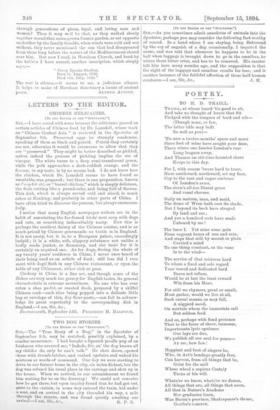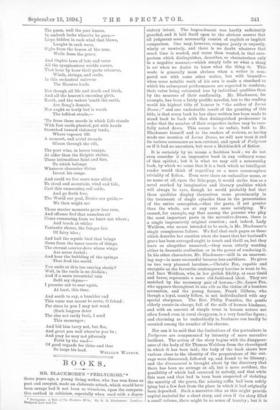POETRY.
TO H. D. TRIILL.
TRAILL, at whose board 'tis good to sit, And take no thought of hours that flit Fledged with the tongues of bard and wit— (Though none, or few, The latter title may befit So well as you)- 'Tis now a twelve-months' space and more Since feet of mine have sought your door, There where one fancies London's roar Long leagues away, And Thames an old-time-haunted shore. Keeps to this day.
For I, with course 'twere hard to trace, Have southward, northward, set my face, Coy to the vast and vague embrace Of London's arms, The siren's all-too liberal grace And venal charms.
Daily on matron, man, and maid, The dome of Wren hath cast its shade,. But I beyond its beck have strayed By land and sea ; And you a hundred mots have made Unheard by me The loser I. Yet mine some gain From vagrant hours of sun and rain, And steps that still by mount or plain.
Carried a mind To one thing constant, as the vane Is to the wind— The service of that mistress hard To whom a fixed and sole regard Your vowed and dedicated bard.
Dares not refuse, Would he at last the least reward Win from his Muse.
For still we rhymers, great or small, Must gather, would we live at all, Such casual manna as may fall, A niggard meed, On mortals whom the immortals call But seldom feed.
And so, perhaps with fond pretence That to the force of sheer, immense,. Importunate lyric opulence Our lays are due, We publish all our soul for pence— Ay me, how few !
Happiest and best of singers he, Who, in Art's bondage greatly free, Can harvest, from all things that be,.
Grist for the mill Whose wheel a copious Castaly. Turns at his will.
Whate'er we know, whate'er we dream, All things that are, all things that seem, All that in Nature's Academe Her graduates learn, Was Bacon's province, Shakespeare's theme, Goethe's concern. The poem, well the poet knows, In ambush lurks where'er he goes,— Lisps hidden in each wind that blows, Laughs in each wave, Sighs from the bosom of the rose, Wails from the grave.
And Orphic laws of lute and verse All the symphonious worlds coerce, That hour by hour their parts rehearse, Winds, strings, and reeds, In this orchestral universe The Maestro leads.
But though all life and death and birth, And all the heaven's enzoning girth, Earth, and the waters 'neath the earth, Are Song's domain, Nor aught so lowly but is worth The loftiest strain,— 'Tie from those moods in which Life stands With feet earth-planted, yet with hands Stretched toward visionary lands, Where vapours lift A moment, and aerial strands Gleam through the rift, The poet wins, in hours benign, At older than the Delphic shrine, Those intimations faint and fine, To which belongs Whatever character divine Invest his songs.
And could we live more near allied To aloud and mountain, wind and tide, Cast this unmeaning coil aside, And go forth free, The World our goal, Desire our guide,— We then might see Those master moments grow less rare, And oftener feel that nameless air Come rumouring from we know not where ; And touch at whiles Fantastic shores, the fringes fair Of fairy isles ; And hail the mystic bird that brings News from the inner courts of things, The eternal courier-dove whose wings Are never furled ; And hear the bubbling of the springs That feed the world.
You smile at this too soaring strain P Well, in the smile is no disdain ; And if a more terrestrial vein Befit my rhyme— I promise not to soar again, At least, this time.
And sooth to say, a humbler end This verse was meant to serve, 0 friend : For since to you I may not wend (Such leagues deter The else not tardy feet), I send This messenger; And bid him tarry not, but flee, And greet you well where'er you be ; And pray he may not piteously Faint by the road— Of good regards for thine and thee So large his load.
WILLIAM WATSON.



































 Previous page
Previous page